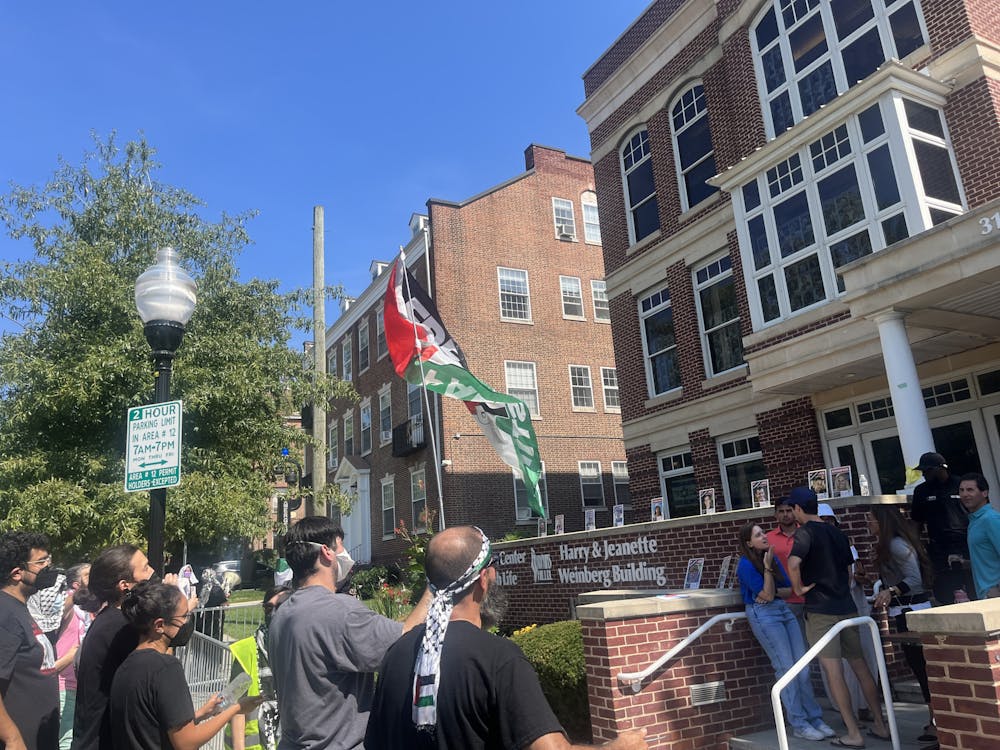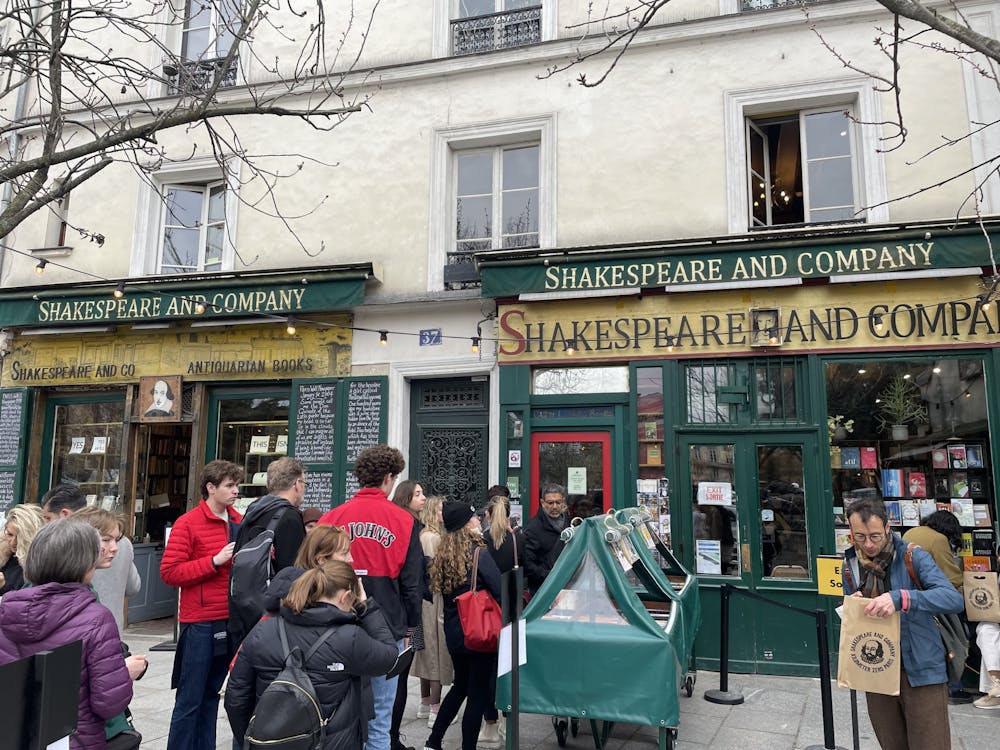On Sept. 15, Hopkins Hillel hosted a talk at the the Smokler Center for Jewish Life at the Harry and Jeanette Weinberg Building with speaker Aaron “Arky” Staiman, an American who serves in the Israel Defense Forces’ (IDF) military reserve as part of the Yasar, a body retrieval unit.
In a press release and an Instagram post shared on the day prior, the Hopkins Justice Collective (HJC) criticized Staiman’s involvement in the IDF’s Yasar and called for an emergency vigil in front of the Smokler Center on the day of Staiman’s visit.
“We cannot overlook the hypocrisy of the Yasar unit claiming to fulfill a religious duty while the IOF [Israeli Occupation Force] actively desecrates Palestinian bodies and disproportionately bombs Palestinians until they are physically unidentifiable,” they wrote.
The protest by HJC began at 10:30 a.m, with a crowd of around 20 protesters, who stood on the median across the road from the Smokler Center holding posters and flyers. Officers from the Baltimore Police Department (BPD) were present. As the protest continued, the crowd grew to around 75 people and protesters migrated to stand behind a metal fence on the sidewalk in front of the building.
A protestor, using the pseudonym Amel, described why she chose to attend the protest in an interview with The News-Letter.
“[Hillel] brought a speaker from the IDF, which infuriates me,” she said. “I’m here to advocate for our cause. I’m against all of what is happening [and] all of this genocide that has been happening for years and years, not just for months.”
During the protest, speakers used the megaphone to state their opposition to Staiman as a speaker, criticize Hillel for hosting the event and read poetry from Palestine.
In an interview with The News-Letter, Wisam Awadallah, a Hopkins graduate worker who attended the protest, described his opposition to Staiman being invited to speak.
“It’s particularly galling to me that this event is for somebody whose job it is to retrieve dead Israeli soldiers as they’re waging this illegal war, while thousands upon thousands of Palestinians are dead in rubble and not afforded that same opportunity,” he said. “I don’t think I [can] stand that hypocrisy not being pointed out.”
Senior Elliott Rosen was amongst those who attended Staiman’s talk, and, in an interview with The News-Letter, he criticized those who were protesting Staiman’s visit and discussed the importance of body recovery for the Jewish faith.
“I think it's a step in the absolute wrong direction to protest in front of Hillel, a place of worship. I think it's really low hanging fruit, not just to protest a visiting member of the IDF, but specifically one who is in the search and recovery unit,” he said. “[The Body Search and Recovery Unit] is really crucial in the Jewish faith, because there are very specific laws about how and when Jewish bodies need to be buried.”
The protest also involved the use of loud noises, including sirens, blaring alarms, drumming sounds, whistling and cheering by protesters that continued for at least 10 minutes uninterrupted.
In an interview with The News-Letter, a student attendee of the event using the pseudonym Ravi stated that the noise level of the protesters could not be heard in the building and did not disrupt Staiman’s speaking. He explained that Staiman focused on mental health in his talk and highlighted that attending these events can foster dialogue on campus.
“If these people would take a seat and listen to what this guy had to say, they’d see he didn’t have anything ridiculously objectionable to say,” he said. “He was talking about mental health in terms of dealing with stress because retrieving dead bodies from a war zone is something that creates post-traumatic stress disorder. If these people would go to these kinds of things and learn, I think there’s more debate to be had from that than to be out here chanting slogans and repeating talking points.”
Regarding the University’s role in discourse on campus, Rosen stated that he would appreciate efforts by the University to organize respectful dialogue on the issue from informed scholars.
“The University has a special role in society to foster understanding and dialogue. I would love it if the University would set up an official platform and bring in scholars bridging this specific political, social and religious divide to talk about this,” he said. “I would love nothing more than to have a nice conversation with some people, but, when it’s loud and there’s a lot of chanting, it’s really hard to do that.”
Protesters also echoed the need for spaces of conservation on campus and similarly called on the University to foster an environment of dialogue on campus.
In an interview with The News-Letter, a protestor, using the pseudonym Layah, discussed how without spaces of dialogue, people are limited to only interacting with like-minded individuals.
“[The University should] create environments and spaces where people can have conversations about this. People who are pro-Palestine are only going to interact with people who are pro-Palestine and people who are Zionists are only going to interact with Zionists,” she said. “At an academic institution that has different values and beliefs, it's important that both sides have a conversation.”
A University spokesperson shared the steps the University has taken to promote dialogue on campus and stated that there would be additional programming later this year in an email to The News-Letter.
“This year, we have started a new dialogue series called Hop Talks that brings the JHU community together for meaningful conversations around critical topics, some related to the 2024 presidential election,” he wrote. “At our SNF Agora Institute and our Hopkins Bloomberg Center we have mounted multiple events designed to bring together people of divergent opinions on critical issues to model effective, thoughtful debate, such as the Two Dads Defending Democracy event just last week.”
According to an University spokesperson, “Baltimore City police were present and managing the event, which took place on a public sidewalk that falls under their jurisdiction.”
At around 11:05 a.m, a passerby allegedly assaulted a protester, neither of whom are affiliated with the University. Officers from the BPD spoke to both parties but did not make arrests. HJC posted a video taken by bystanders to their Instagram page.
In an interview with The News-Letter, the protestor, using the pseudonym Mariam, shared her experience and the response by police.
“I was standing here chanting with the rest of the protesters. He came out of his way towards me and hit my megaphone into my face, which hit my teeth,” she said. “The police said they could file a report, but they could not do anything [else] because they did not see it firsthand, despite all the videos we have showing him coming and hitting me.”
The passerby, using the pseudonym of David, denied that he assaulted Mariam in an interview with The News-Letter.
“I was walking and she put a bullhorn literally in my ear and screamed, so she assaulted me,” he said. “I pushed it out of my ear, which is a natural reaction when you have a bullhorn screamed in your ear from less than a foot away.”
The BPD did not respond to The News-Letter’s request for comment at the time of publication.
Shirlene John and Lana Swindle contributed reporting to this article.





